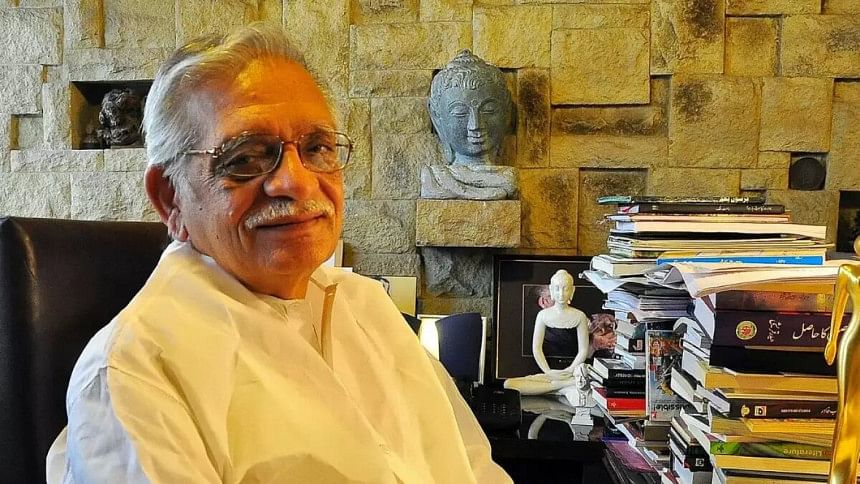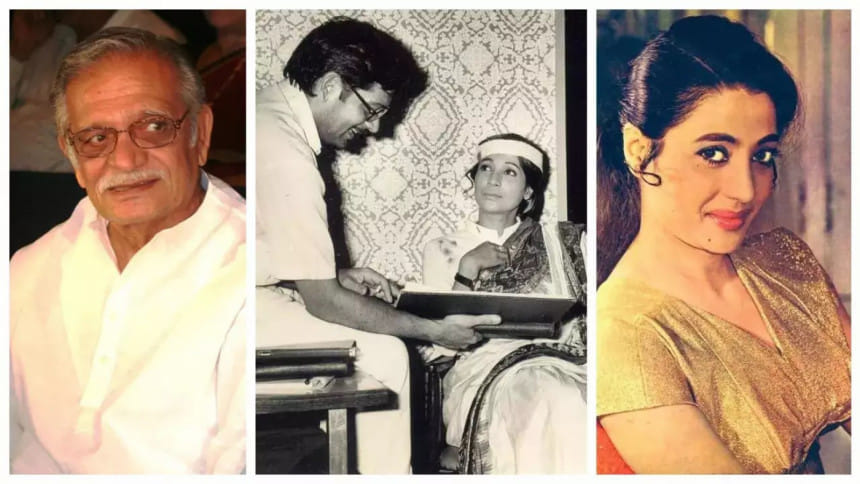Gulzar’s 89th birthday: Celebrating the legendary wordsmith

As the world celebrates the 89th birthday of the legendary poet and lyricist Gulzar, it is only fitting to delve into the profound influence he has had on our emotions through his enchanting verses. Among his many themes, the rain stands out as a recurring motif in his poetry and songs, evoking a sense of melancholy and longing that only he can masterfully convey.
On this special occasion, let's explore a dozen of Gulzar's rain-themed creations from the last few decades, reflecting on his unique ability to capture the essence of the monsoon and the accompanying emotions.

Rain as a living entity
Gulzar's experiments with poetry have given birth to a multitude of enchanting images, none more captivating than his portrayal of rain as a sentient being. His line, "Baarish hotee hai toh paani ko bhi lag jate hain paaon" (When it rains, even water gets wet feet), personifies raindrops with playful feet that go running. In an interview, Gulzar once described the monsoon as "the most physical of all seasons, a season you can touch and see," which often led him to write "a trifle too personally." He delved into the rains not only through film lyrics but also in his non-film poetry, which speaks to the universal connection he felt with this season.
Gulzar, born Sampooran Singh Kalra on August 18, 1934, in Dina, Punjab (now in Pakistan), is a versatile genius who has effortlessly traversed the realms of poetry, lyrics, screenwriting, and direction. His work is celebrated for its deeply introspective and evocative nature, often delving into the complexities of human emotions and relationships. Whether through his poignant film lyrics, soul-stirring poems, or thought-provoking films, Gulzar has captivated the hearts of millions.
Gulzar's exploration of rain is not limited to joy and delight; his rain-themed poems often carry a melancholic undercurrent that is uniquely his. Lines like "Kaise chup chaap barastaa hai musalsal paani" (How the silent rain falls, steadily) and "Dekh kaise baras raha hai udaas paani" (See how the sad rain pours) resonate with a sense of yearning and sorrow that only he can convey. These verses weave the steadfastness of rain with its power to evoke memories, creating an emotional tapestry that touches the heart deeply.
A lover's gaze through rain
Gulzar's exploration of rain also extends to his film songs, where he beautifully intertwines emotions with the weather. One remarkable aspect of his songs is his unique perspective, often presenting the rain through the lens of a woman's experience. In "Sawan Ki Raaton Mein" (Prem Patra, 1962), Gulzar's words evoke a lost soul finding its way amidst the storm, or perhaps a lover seeking solace in the midst of turmoil. The beauty of his words lies in their ambiguity, inviting multiple interpretations that add layers to the song's meaning.
In songs like "Jhir Jhir Barse" (Aashirwad, 1968) and "Bole Re Papihara" (Guddi, 1971), Gulzar brings the rain and tears together in a mesmerising blend. He describes raindrops hitting the skin as "reshmi boondiya tan pe maare, chhed kare bheegi bouchhare", infusing the rain with both agony and playfulness. The connection between tears and the monsoon is presented through the evocative term "saawani ankhiyan" (monsoon-laden eyes), highlighting Gulzar's mastery of marrying emotions with nature.
Rabindranath Tagore's profound influence on Gulzar
The influence of Rabindranath Tagore on Gulzar's artistic journey is undeniable. Tagore, a polymath who reshaped Bengali literature and music, had a profound impact on Gulzar's creative expression. Tagore's emphasis on the interplay of emotions and nature, his exploration of spirituality, and his ability to convey profound thoughts in a simple yet profound manner resonated deeply with Gulzar's sensibilities.

Tagore's poetry often dealt with complex human emotions, exploring the depths of love, longing, and melancholy. Gulzar, too, found inspiration in delving into the human psyche and expressing emotions that were universal yet uniquely personal. His lyrics and poetry are replete with emotions that touch the core of the human experience.
Crossing linguistic boundaries
Just as Tagore's works were not confined to Bengali, Gulzar's art transcends linguistic barriers. Gulzar's ability to evoke emotions and capture the essence of a story in his lyrics and poetry made his work universally relatable, much like Tagore's.
There's an inherent and childlike restlessness that fuels Gulzar's creative spirit and writing. Despite stepping into his 89th year, The Sahitya Akademi and Dadasaheb Phalke award-winner remains an unstoppable force. Beyond his iconic contributions, he embarked on a diverse array of pursuits in 2016, including the translation of works by 17 different poets for his book titled "A Poem A Day", which was published in 2020. This tireless pursuit of creativity, this autodidact's desire for innovation, is the driving force behind the poet, writer, and filmmaker's continued impact on our artistic landscape.
Adding to his illustrious journey, the culmination of his five-year-long labour of love— the translation of Rabindranath Tagore's poetry into Hindustani, a beautiful collection titled "Nindiya Chor and Baaghbaan" – serves as a testament to Gulzar's enduring dedication to literary exploration. Moreover, he also graced literature enthusiasts with a collection of his televised screenplays, "Tehreer Munshi Premchand Ki", a true reflection of his multifaceted talents.
Weaving cinematic poetry through the lens
Gulzar, a name that resonates with lyrical finesse and poetic brilliance, is not only renowned as a masterful poet and lyricist but has also left an indelible mark in the world of Indian cinema as a filmmaker. With a distinctive directorial style, Gulzar has crafted films that are not just narratives, but rather a symphony of emotions that resonate deeply with the human experience.

Gulzar's journey into filmmaking was a natural progression from his passion for literature and poetry. His early career as a lyricist provided a solid foundation for his later directorial endeavours, as his songs often carried a narrative quality and visual imagination. Gulzar's transition from a wordsmith to a filmmaker was marked by his debut film "Mere Apne" in 1971, which foreshadowed his ability to capture the complexities of human relationships on celluloid.
One of the distinct features of Gulzar's filmmaking is his impeccable storytelling technique. His films are characterised by their attention to detail, nuanced character development, and exploration of human emotions. "Aandhi" (1975), a poignant story of a couple's reconciliation amidst political turmoil, is a prime example of how he used interpersonal relationships as a canvas to reflect larger societal issues. This ability to intertwine the personal with the political sets Gulzar's films apart, making them both emotionally resonant and socially relevant.
Apart from his directorial prowess, Gulzar's visual aesthetics are a testament to his poetic sensibilities. His films are visually poetic, with frames that often resemble a canvas painted with emotions. "Ijaazat" (1987), a heart-wrenching tale of love and separation, features hauntingly beautiful visuals that mirror the melancholic undertones of the story. The interplay of light and shadow, coupled with his penchant for capturing the beauty in everyday moments, highlights his deep understanding of the visual language of cinema.
Gulzar's films have often been celebrated for their music and lyrics, an aspect he skillfully integrates into his directorial vision. His collaborations with music composers like RD Burman, AR Rahman, and Vishal Bhardwaj have resulted in soul-stirring soundtracks that complement the narrative seamlessly. Songs in his films are not mere musical interludes but serve as poetic extensions of the emotions and themes explored in the story. Who can forget the haunting melody of "Tere Bina Zindagi Se" from "Aandhi" or the soulful "Tere Bina" from "Guru"?
Over the years, Gulzar's directorial journey has been punctuated with accolades and recognition. His film "Mausam" (1975) won the National Film Award for Best Feature Film, and "Maachis" earned him the National Film Award for Best Popular Film Providing Wholesome Entertainment. Apart from these, he has been bestowed with several Filmfare Awards and Padma Bhushan, one of India's highest civilian honours, for his contribution to arts and cinema.
As we celebrate Gulzar's 89th birthday, his rain-soaked verses and timeless songs remind us of his exceptional ability to capture the intricacies of human emotion through the lens of the monsoon. Gulzar's legacy, like the rain he so beautifully encapsulated, continues to touch our hearts and awaken our emotions. Happy Birthday to the maestro of melancholy, whose verses will forever resonate with the rain's gentle cadence and the human soul's unspoken yearnings.

 For all latest news, follow The Daily Star's Google News channel.
For all latest news, follow The Daily Star's Google News channel. 





Comments